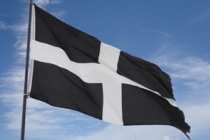‘The financial impact of tourism in Cornwall: an assessment’ - discussing the findings and revelations made by Dr Bernard Deacon

‘The financial impact of tourism in Cornwall: an assessment’
We are very pleased to enclose a link to a short on line paper prepared by that great Cornish academic, Doctor Bernard Deacon, who has, with others, been taking an objective look at some of the wilder claims made by those who financially benefit from tourism in Cornwall.
As we all know, these claims are often picked up and run in the mainstream media who accept such assertions without proper investigation.
Tourism is very much ‘low hanging fruit’ in terms of cash generation. It has been described by an increasing number as more extractive than tin mining ever was because a large percentage of the sum raised leaves Cornwall and does us no good at all. Think of supermarket spending, fuel station spending, out of Cornwall ownership of tourist parks and the like, for example. The late David Penhaligon, Cornwall's best ever MP recognised this and the fact that we needed better, more sustainable and reliable sources of income.
We at ‘Kernow Matters’ revealed in a Financial Times article back in June, 2021, the words of Malcolm Bell, one of the Directors of Cornwall’s privatised and subscribing members tourism promotion company ‘Visit Cornwall’ which is registered at Companies House, when he confirmed that tourism adds around 12% to Cornwall’s overall GDP. Cornwall’s GDP is estimated at £12.3 billion per annum by Eurostat, so more than a great number of independent countries.
Our studies have also lead us to conclude that the tourism lobby was prone to gross exaggeration as Dr Deacon now demonstrates, in order to justify their mainly extractive and often highly damaging enterprises brought on by over tourism which has been highlighted in many places around the globe including Venice, the Spanish Costas, Barcelona, the Greek Islands and so on, where tourist taxes now exist to offset the effects of too many holiday makers.
Research into other areas broken down in to what are referred to as ‘Nomenclature of Territorial Units for Statistics’ regions (amusingly abbreviated to NUTS2 regions) reveals Cornwall is not the most reliant area on tourism.
In terms of Gross Value Added (GVA) to their economies as opposed to Gross Domestic Product (GDP) in which GVA is seen as the best marker because as an economic productivity metric it measures the contribution of a corporate subsidiary, company, municipality or venture to an economy, Greater London by far exceeds Cornwall with 11% GVA generated by tourism, with Cornwall laying in fifth place with about 8.1% GVA generated by tourism. This study was conducted by Eurostat. We have in our possession a copy of that bar chart.
Dr. Deacon examines this in his study, a copy of which he has published on a blogsite attached and breaks the figures down carefully.
Of course, the figures also include so called ‘local spend’, as an example, a family who live in Cornwall go out for a day to say ‘Flambards’ Theme Park near Helston and spend there.
At the end of his look at the topic, Dr. Deacon, after appealing to journalists not to take at face value the often grossly inflated figures used by some who gain from tourism inviting them to examine his findings and the calculations leading to them, summarises by saying, “Moreover, this assessment of the contribution of tourism to Cornish GVA does not take into consideration either the social costs (of second homes, congestion, pressure on services), environmental impact (a study of Cumbria – A Carbon Baseline for Cumbria, 2020, p.22 – concluded that tourist activities account for almost half its total greenhouse gas production. It would no doubt be similar for Cornwall) or the longer-term disastrous cultural effects on the Cornish people.”
Whilst agreeing wholeheartedly with the words of Dr Deacon and laying part of the blame for Cornwall's housing crisis firmly at the feet of the tourism sector, we have also constantly warned of the rather bleak possibilities referred to by Professor Richard Butler in his world-wide tested and highly respected study into touristic outcomes.
Link to Dr Deacon’s assessment: https://cornwalldevelopersparadise.wordpress.com/2021/09/16/the-financial-impact-of-tourism-in-cornwall-an-assessment/?fbclid=IwAR2Ai-Uty7rvwVm6loG-ywMW4kxkIfpXNW-c484s1QwvSK1HBVjHM-qFMNY
No one can be against tourism per se but it needs to be properly controlled as part of a balanced economy and in times when the effects of global warming and public health impact are becoming ever more evident, such controls need to be carefully applied.
This year, we have all felt and witnessed the adverse affects of over tourism, we have seen our public and health services overwhelmed, locals abused, insulted and even assaulted and pollution increased, coupled with log jams on the roads and virtual no go areas in some coastal towns. This is reckless mismanagement and occurs with little or no public and democratic oversight.
Dr. Bernard W. Deacon is a multidisciplinary academic, now retired who was based at the Institute of Cornish Studies of the University of Exeter at the Tremough Campus, Penryn.
Thank you for reading,
The Kernow Matters Team





